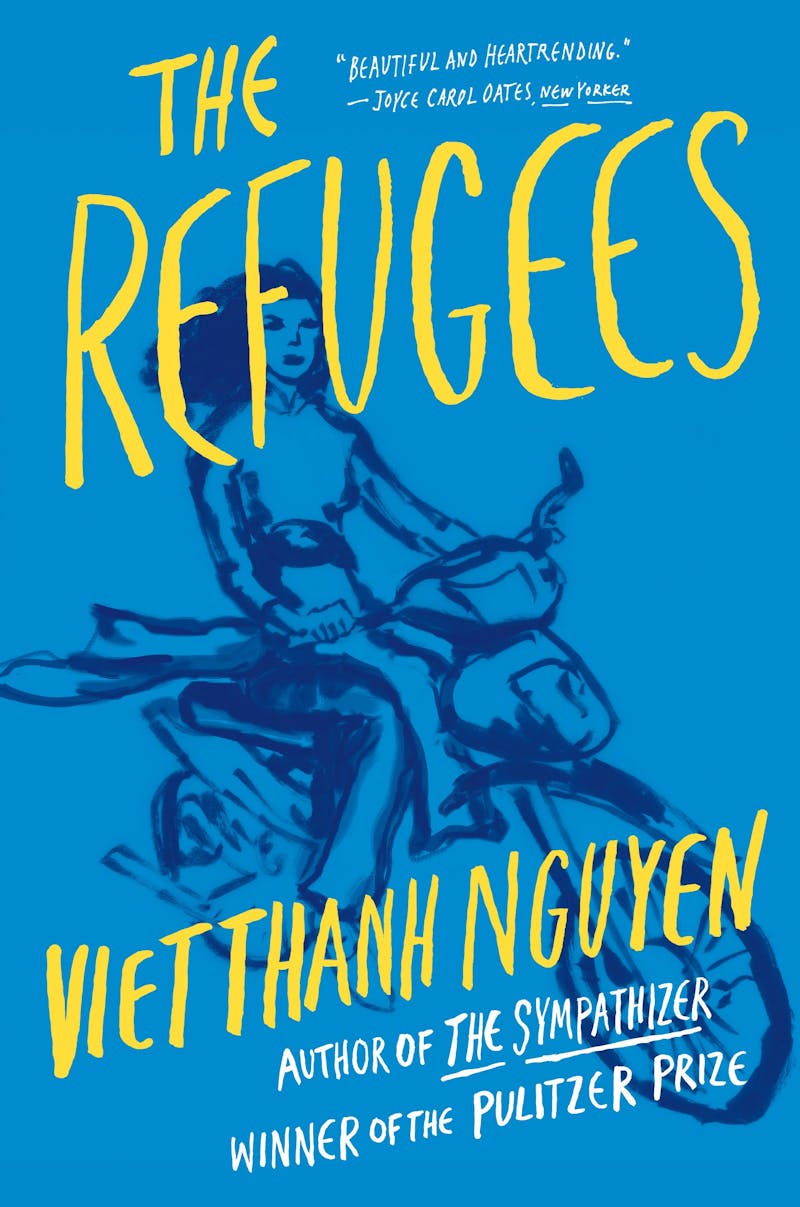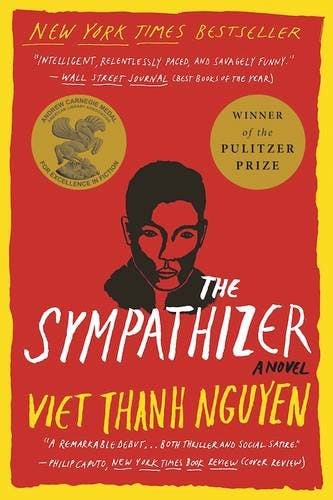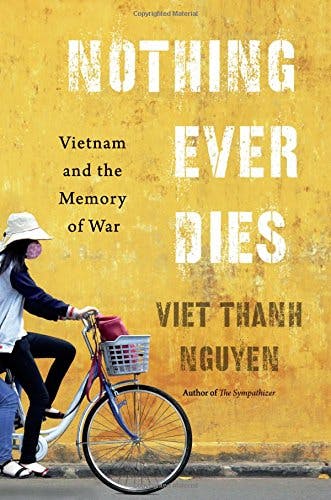“All wars are fought twice, the first time on the battlefield, the second time in memory.” Thus opens Viet Thanh Nguyen’s 2016 nonfiction book Nothing Ever Dies, which surveys the quieter, later battlefield of the Vietnam War. Memories, unlike gunfights, do not have beginnings or endings. They repeat and layer and merge with one another, brewing new dreams for the survivor each night. Shimon Peres wrote almost an identical phrase about memory in David’s Sling, which goes to show that all wars have certain things in common.

Nguyen, 46, waited decades for his moment. In the last two years he has published three definitive books about the experiences of Vietnamese refugees who, like his family, fled their country after the war. In addition to Nothing Ever Dies, there is the novel The Sympathizer, which won the 2016 Pulitzer Prize, and a collection of short stories, The Refugees, which was released in February of this year.
“I had wanted to work on these projects when I was 21 years old,” Nguyen said when we spoke recently. Over Skype, he was direct and hyper-cogent, the kind of person who speaks in full paragraphs. He described a career guided by the kind of foresight that allows a writer to land all at once on the shores of the Pulitzer.
Nguyen had an aptitude for scholarship as a young man, so he went straight into a PhD program after college. There, his department chair told him that he’d never get a job if he focused on Vietnamese literature. “I became a conventional academic,” Nguyen said. He earned tenure in 2003, the natural result of a young life lived in a “very pragmatic, very strategic way,” an approach that “required a lot of repression.”
It would be gauche and inappropriate to compare Nguyen’s patience to that of a sleeper agent, but the parallel practically draws itself. The Sympathizer is the caustic, hyper-verbal tale of a double agent embedded in California after the end of the war, sending information back to Vietnam about the activities of the men who are both his friends and enemies.
Living a doubled kind of intellectual life is also reflected in the way he wrote these three books. “That was a minimum of twelve years of work,” Nguyen said of The Sympathizer, “and I was working on the short stories and Nothing Ever Dies at the same time.” Writing the short stories was a struggle, he said—“a pain in the ass.” But when he came to The Sympathizer, “as a writer I broke through. I was able to achieve a technical level that I didn’t know I could reach. But also psychologically I broke through, in the sense that I just decided: I don’t give a fuck anymore.” On the other side of all those years of rigor, the voice came singing out.
In the war of memory, the commemoration and consecration of the dead is one battleground. But there is a being that demands consolation, too: the ghost. In the very first story of The Refugees, a sister opens the door to see her dead brother standing there. He’s dripping with water. “Even though it was not raining, he was water-soaked. I could smell the sea on him, and worse, I could smell the boat, rancid with human sweat and excreta.” The boat was their means of escape. The brother died defending our narrator from rape.

The ghost is an apt figure for the war that is fought a second time. It is a metonym for the memory of a living person, as well as the vocalizing embodiment of death itself. The ghost is a kind of walking death-in-life principle. “I don’t think I have ever seen a ghost,” Nguyen told me. “But I do know people who have.” He believes in them “as a figurative sign of haunting, given everything that [he] experienced growing up in the Vietnamese refugee community.” Back in Vietnam, Nguyen explained, “I had an adopted sister that we left behind.” He only knew her by a black and white picture that belonged to his parents. “So I grew up literally knowing there was a missing person in the family, and not really understanding why. That is a kind of a haunting.”
The ghosts of The Sympathizer are much more vengeful and unpleasant than the ghosts that haunt The Refugees. Nguyen says the short stories represent a “compensatory” act of creation, a “gesture of humanization that has its uses aesthetically and politically.” Its ghosts are tender beings. By contrast, the ghosts of The Sympathizer “are not there to compensate or to assure, or assuage people’s feelings. They’re there for revenge.”
Milan Kundera described the occupation’s repression of Czechoslovak writers as an “organized forgetting.” In response to such policies of forgetfulness, Nguyen says the writer must aim for “a complex ethics of memory.” And memory is the most resonant note of The Sympathizer’s crazy fugue. As the protagonist listens to a gorgeous Vietnamese woman sing Nancy Sinatra, he sinks back into the past.
…the streets and homes blown away by bombshells; the streams where we swam naked and laughing; the secret grove where we spied on the nymphs who bathed and splashed with the innocence of the birds; the shadows cast by candlelight on the walls of wattled huts; the atonal tinkle of cowbells on mud roads and country paths; the barking of a hungry dog in an abandoned village; the appetizing reek of the fresh durian one wept to eat; the sight and sound of orphans howling by the dead bodies of their mothers and fathers; the stickiness of one’s shirt by afternoon, the stickiness of one’s lover by the end of lovemaking, the stickiness of our situations…
It is a litany of memory, a litany in the original sense of a series of prayers recited call-and-response style by a congregation. It’s a litany provoked by art, too—a simple pop song that turns into a political prompt. At the end of the litany, the final lesson: “the most important thing we could never forget was that we could never forget.”

I put it to Nguyen that his self-appointed task (the demands of ethical representation, which is all the more urgent for an under-represented community) and the task that he gives to his characters (the fight against forgetting itself) must be stressful. The word he uses in response is “very.” “I’ve been someone who—since he was eighteen or nineteen and was studying postcolonial and ethnic and minority literatures—has been very attuned to issues of ethics, of memory, of representation in art, and the intersection of art and politics.”
Isn’t writing a book something like creating a public monument? (Nothing Ever Dies includes a significant analysis of public monuments to war and loss, like the Vietnam Veterans Memorial in Washington, D.C.) He wasn’t sure, since there’s no way to know whether a book will be successful: “Is a monument a monument if it sits in a garage?” But he conceded that a book could still be a private monument, like a domestic shrine or a gravestone. We remember our beloved dead in a way that extends into public mourning, processing the memory of war into a part of national identity.
When Nguyen was writing The Sympathizer, he dug up some old notes from his time studying nineteenth- and twentieth-century American literature in graduate school. “I had a big, gigantic binder of my qualifying exam notes, and I put it on the shelf.” Nguyen never looked at it, exactly, but that corpus was a reminder that his book needed “to respond to that literary history.” In the deliciously-named Richard Hedd of The Sympathizer, he sends up the Huntingtons and Kissingers of this world, the American Orientalists who “think they know what World Chess is and had it completely wrong.”
And at the heart of his version of history lies the detail of war, rather than the “macro” perspective of the historians. In the multiple treatments of rape and other forms of sexual violence in his books, he explores the effect of trauma on the memory. He shows the power of one’s own mind to occlude what one has witnessed, especially when it is a key to understanding something important—something that you have forgotten to remember.
In a way, the novelist’s role in the culture is similar to a ghost’s within a family. A work of fiction haunts us: It watches over the shoulder, inspires memories, encourages reflection. Viet Thanh Nguyen’s books are almost overwhelming in their capacious embrace of a war that was so very, very big. But Nguyen’s career is evidence that patience and memory are intertwined parts of the brain. Sometimes a writer must wait and remember, until the voice of memory emerges. Then, like a ghost, it can never die.
